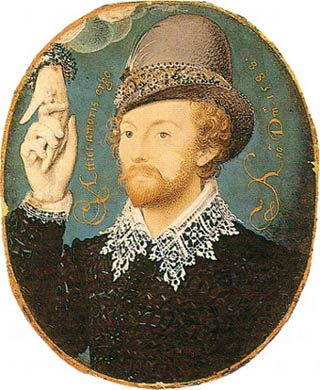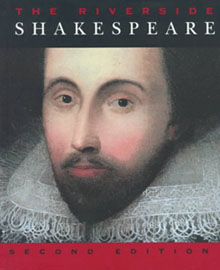DOMAIN OF THE ARTS
Section 01
Spring 2005
SLN 54833
MWF 2:10 - 3:00
Honors 142
Dr. Michael Delahoyde
Avery Hall 355 -- Washington State University
Hours: MWF 8:30 - 10:00 am, and by appointment.
Phone: 509-335-4832
E-mail: delahoyd@wsu.edu

|
DOMAIN OF THE ARTS Section 01 Spring 2005 SLN 54833 MWF 2:10 - 3:00 Honors 142 Dr. Michael Delahoyde Avery Hall 355 -- Washington State University Hours: MWF 8:30 - 10:00 am, and by appointment. Phone: 509-335-4832 E-mail: delahoyd@wsu.edu
|

|
Course Description:
I am reasonably certain this is the first time ever such a course has been offered anywhere at any time on earth: a semester of researching and studying the multi-disciplinary works of Edward de Vere, 17th Earl of Oxford (1550-1604) and his life at Queen Elizabeth's court.De Vere was especially influenced by Italian art and fashion (we'll see some of what he saw and lots of other relevant images and artworks). He was a prodigy in law, medicine, astronomy, and more. He was praised as a courtier surpassing the professionals in musical talent (and is probably responsible for the English madrigal fad). And as a playwright he was cited in his day as "best for comedy" -- an accurate assessment, since among other pseudonyms he also wrote plays and poetry under the name of Shake-speare.
Plan on creating your own new scholarly path into the Renaissance materials as you develop an original expertise, not following well-trod pathways. We will very likely be exploring new ground as we examine the poetry, prose, plays, and music that de Vere produced, as well as the Renaissance paintings, sculpture, fashion, and other arts with which he saturated himself. And we may be restoring to him some artistic credit long overdue.
Course Objectives:
To gain exposure to Renaissance (or Early Modern) thought, poetic craft, music, art, and drama by poring over the works of one rather well-known English author.To increase intellectual maturation and clarification of our own values through examination of ideas and attitudes in literary/cultural contexts and through articulation of these.
To develop skills in verbal analysis, critical thinking, and detection of subtlety through reading, discussion, and writing about some tricky literature and other arts issues.
Required Text:
The Riverside Shakespeare. 2nd ed. Boston: Houghton Mifflin Co., 1997. |
 |
Course Requirements:
A significant part of your life this semester has to become de Vere studies. Studying even Shakespeare can be demanding, but we together as a "learning community" face the additional obstacle of operating as a heresy. Because classroom interaction is essential for this to be a valuable experience, and because frequent materials and writings will be exchanged and no late assignments of any sort will be accepted, more than a few absences will affect your grade regardless of reason. Here’s the math:I will frequently ask for relatively minor homework assignments to be turned in (or posted to the Bridge), designed primarily to stimulate subsequent discussion [although it will arise anyway because the readings are so provocative (i.e., cool)] and to practice conventions for writing about literature and the arts. At other times I will ask you to answer questions in writing in class, often ad lib responses to the reading before class discussion begins. Homework assignments and quizzes will receive numerical grades (points) and, although these writings cannot be made up (except for a couple optional writings that can take their place), the final semester totals will be curved if necessary. (30%)
You will submit two written projects of manageable length. (30%)
Your presence will be kindly requested at two exams. (30%)
Class participation and other service to the learning community will be expected (occasional group work, for example). (10%)